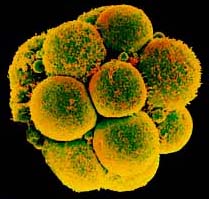
As with any new technology, it is impossible to anticipate the innovation and more importantly the permeation of the results of stem cell research in our lives. One of the more obvious repercussions of the use of stem cells as methods of treatment is a higher quality of life. Easier access to treatments for many previously untreatable diseases will have profound effects around the globe, especially in third world countries where degenerative diseases are very common and are the cause of many deaths. Quality of life will also be increased by the discovery of new methods for cancer treatment through stem cell research, as well as treatments for diseases such as Parkinson's, Alzheimer's, and diabetes. In such disorders, where the replacement of dysfunctional tissue is the only way to restore the body back to normal, stem cell research provides the only potential for treatment at the moment. All other drugs are only able to delay the effects, not reverse them. The potential for using this technology to alter the human genome can also lead to such benefits as longer life-spans and less susceptibility to disease. This would help alleviate plagues, eradicate disease (as has been done with smallpox), and eliminate the need for fear from bioterrorism, an anxiety that America is facing at the moment.

Along with any positive impacts, there are of course the negative consequences
that follow the application of stem cell research. Unregulated, unsupervised
experimentation in the field can lead to uncontrolled abuse of knowledge
and power. There has always been an underlying fear in stem cell research
that a scientist might create a human "Dolly."  This
fear was further magnified in November 2001 when news media across the
nation reported that two cloned embryos had been induced to divide in
the same manner as a human baby. While these clones did not develop beyond
five or six divisions, they reminded us that the beginning of human cloning
would symbolize the opening of a new Pandora's Box where all scientists
are viewed in the same light as Shelley's Dr. Frankenstein. Another problem
could also appear out of the affinity of scientists for embryonic, rather
than adult, stem cells due to their increased pluripotency and, therefore,
experimental efficiency. Such preference for embryonic stem cells does
entail the acknowledgement of surrounding conflict. Because the cells
are extracted from a fertilized egg, many believe that obtaining embryonic
stem cells involves the death of laboratory created "test-tube babies."
Proponents of such pro-life codes, including moral and religious activists,
claim that the extraction of embryonic stem cells should be considered
a capital offense.
This
fear was further magnified in November 2001 when news media across the
nation reported that two cloned embryos had been induced to divide in
the same manner as a human baby. While these clones did not develop beyond
five or six divisions, they reminded us that the beginning of human cloning
would symbolize the opening of a new Pandora's Box where all scientists
are viewed in the same light as Shelley's Dr. Frankenstein. Another problem
could also appear out of the affinity of scientists for embryonic, rather
than adult, stem cells due to their increased pluripotency and, therefore,
experimental efficiency. Such preference for embryonic stem cells does
entail the acknowledgement of surrounding conflict. Because the cells
are extracted from a fertilized egg, many believe that obtaining embryonic
stem cells involves the death of laboratory created "test-tube babies."
Proponents of such pro-life codes, including moral and religious activists,
claim that the extraction of embryonic stem cells should be considered
a capital offense.
